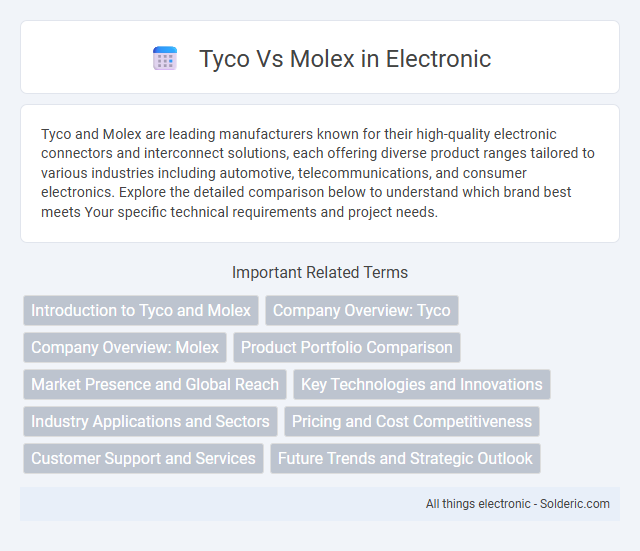Tyco and Molex are leading manufacturers known for their high-quality electronic connectors and interconnect solutions, each offering diverse product ranges tailored to various industries including automotive, telecommunications, and consumer electronics. Explore the detailed comparison below to understand which brand best meets Your specific technical requirements and project needs.
Comparison Table
| Feature | Tyco | Molex |
|---|---|---|
| Industry Focus | Electrical and electronic connectors, fire protection, and security solutions | Electronic, electrical, and fiber optic interconnect solutions |
| Product Range | Connectors, relays, sensors, cable assemblies, fire & security systems | Connectors, cable assemblies, antennas, sensors, fiber optics |
| Global Presence | Strong global reach with plants and offices worldwide | Global operations with manufacturing and support facilities worldwide |
| Innovation | Focus on robust industrial and safety technologies | Advanced interconnect solutions for diverse industries |
| Parent Company | Part of TE Connectivity | Independent, part of Koch Industries portfolio |
| Market Applications | Automotive, aerospace, industrial, security | Automotive, data communication, consumer electronics, industrial |
Introduction to Tyco and Molex
Tyco Electronics, now known as TE Connectivity, specializes in connectivity and sensor solutions for diverse industries such as automotive, aerospace, and telecommunications. Molex offers a broad range of electronic components, including connectors, cables, and interconnect systems widely used in data communications, consumer electronics, and industrial applications. Both companies are recognized for innovation, reliability, and global reach in the electronic components manufacturing sector.
Company Overview: Tyco
Tyco International was a global leader in security solutions and electronics manufacturing, specializing in advanced electronic connectors, sensors, and interconnect components. The company served key industries such as telecommunications, automotive, aerospace, and industrial markets with innovative connectivity products designed for high performance and reliability. Tyco's extensive product portfolio and global manufacturing footprint positioned it as a critical supplier in the electronics and industrial sectors.
Company Overview: Molex
Molex is a leading global manufacturer specializing in electronic, electrical, and fiber optic interconnection systems, serving industries such as automotive, data communications, industrial, and consumer electronics. Founded in 1938 and headquartered in Lisle, Illinois, Molex operates with a strong emphasis on innovation, quality, and customer-centric solutions. The company's extensive product portfolio includes connectors, cables, switches, and antennas, positioning it as a key player in the global interconnect market.
Product Portfolio Comparison
Tyco offers a diverse product portfolio specializing in electronic components and connectors for automotive, industrial, and telecommunications sectors, emphasizing high-reliability solutions. Molex provides a broad range of interconnect solutions, including connectors, cable assemblies, and antenna products, targeting data communications, consumer electronics, and automotive industries. Your choice between Tyco and Molex depends on specific application needs such as product variety, technological innovation, and industry compatibility.
Market Presence and Global Reach
Tyco and Molex both exhibit strong market presence with extensive global reach in the electronic components industry. Tyco operates in over 50 countries, leveraging a diverse product portfolio to serve sectors such as telecommunications, automotive, and aerospace. Molex maintains a broad international footprint with manufacturing and sales facilities across North America, Europe, and Asia, enhancing its ability to meet global demand efficiently.
Key Technologies and Innovations
Tyco excels in advanced connector systems and electronic components, specializing in high-performance aerospace and automotive solutions with technologies like Ultra-Fast Connectors and Signal Integrity design. Molex leads in versatile interconnect solutions, pioneering innovations such as Micro-Lock connectors and high-speed data transmission interfaces for telecommunications and consumer electronics. Both companies drive critical advancements in miniaturization, enhanced signal integrity, and robust design for harsh environments.
Industry Applications and Sectors
Tyco specializes in providing electronic components and interconnect solutions across automotive, aerospace, industrial, and telecommunications sectors, with a strong presence in high-reliability applications such as defense and medical devices. Molex offers a broad range of interconnect and electronic solutions tailored for data communications, consumer electronics, automotive, and industrial markets, emphasizing innovative connectivity for smart devices and IoT applications. Both companies serve key industries with tailored product portfolios that support advanced technology integration in complex electronic systems.
Pricing and Cost Competitiveness
Tyco and Molex both offer competitive pricing structures tailored to high-volume industrial and electronic connector markets, with Tyco generally positioned as a cost-effective solution for budget-sensitive projects without compromising quality. Molex often commands premium pricing due to its extensive product customization options and advanced technology integrations, appealing to businesses requiring specialized connectivity solutions. Understanding your project's specific requirements will help determine if Tyco's affordable pricing or Molex's value-added features provide the best cost competitiveness.
Customer Support and Services
Tyco and Molex both offer comprehensive customer support and services, with Tyco emphasizing 24/7 technical assistance and a global network of service centers to ensure rapid response times. Molex provides extensive design support, custom solutions, and dedicated application engineering teams to help clients optimize product integration and performance. Both companies prioritize customer satisfaction through tailored training programs, responsive maintenance services, and streamlined communication channels.
Future Trends and Strategic Outlook
Tyco and Molex are advancing in smart connectivity and IoT integration to meet evolving industry demands, with Tyco investing heavily in automation and AI-driven solutions to enhance manufacturing efficiency. Molex is focusing on expanding its portfolio in high-speed data and optical interconnect technologies to support next-generation communication networks and electric vehicles. Both companies emphasize sustainability and digital transformation as core components of their long-term strategic outlook to maintain competitive advantage in the global electronics market.
Tyco vs Molex Infographic

 solderic.com
solderic.com